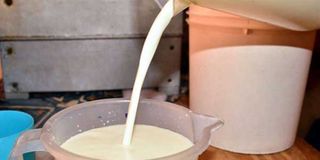Agency raises red flag over dangerous milk

Kenya Dairy Board has raised the alarm over heavy presence of drug residues, including antibiotics, pesticides and preservatives in milk. FILE PHOTO | NATION MEDIA GROUP
The Kenya Dairy Board has raised the alarm over heavy presence of drug residues, including antibiotics, pesticides and preservatives in milk.
KDB Voi Branch Manager and Senior Dairy Development Officer Kaberia Muriungi said samples tested over the past year showed much of the milk as unfit for human consumption.
“Most samples we have tested have shown a presence of aflatoxins and preservatives, which are health hazards,” said Mr Muriungi, who attributed it to failure by farmers to observe withdrawal periods after their dairy cattle have been treated.
MILK QUALITY
Speaking in Voi at a regional workshop on milk quality standards, he said most farmers did not comply with treatment advice by veterinarians.
“We have also noticed presence of stress hormones in milk because animals are not being taken care of properly,” said Mr Muriungi. “We cannot rule out the possibility that we are consuming milk with high contents of these hormones.”
Drug residues that the official said were discovered in raw milk are detergents, disinfectants, pesticides and mycotoxins. Mr Muriungi also cited cases where traces of preservatives such as formalin and hydrogen peroxide were discovered in milk.
“Farmers are not observing withdrawal periods; some of them are just after making money,” said Mr Muriungi. “It is a thing we are looking into to make sure there is proper sensitisation.”
REJECTION
Other factors the official said affected the quality of milk are addition of wheat flour and water in a bid to increase quantity.
Mr Muriungi, however, said the quality of milk in Kenya is fairly good but is yet to attain the required standards. He said dilution with water had led to rejection of up to 16 per cent from collection centres with acidity levels as high as 10 per cent.
“This is because of poor milk handling along the value chain from the farmer through the transporters to the milk traders,” said Mr Muriungi.
He said the biannual quality survey report has showed a high bacterial load of up to 10 million per millilitre of milk while the standard is 2 million per millilitre.
Wumingu Milk Cooling Plant unit supervisor Daniel Nyongesa said they have rejected more than 30,000 litres of milk over quality concerns.





